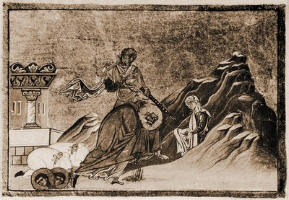
The Works Of Dionysius The Areopagite Volumes 1 & 2
LUCIUS FLAVIUS DEXTER
Dexter was a friend of Jerome. Jerome even addresses him as “filius amicus,” and describes him as “clarus apud sæculum et Christi fidei deditus.”
Dexter became Prefect of the Pretorian Oriental Guards, and was one of the most illustrious statesmen of his time. He resided two years in Toledo. From the archives of the Church of Toledo and other cities he compiled a chronicle from A.D. 1 to A.D. 430, giving a brief summary of the Church events in Spain. That chronicle he dedicated to Jerome, who enrolled both Chronicle and Author amongst his “illustrious men.” It was at the request of Dexter that Jerome wrote his book on Ecclesiastical Writers. Among the earliest Bishops of Toledo, Dexter describes a remarkable man,—Marcellus,—surnamed Eugenius, on account of his noble birth.
Bivarius says he was of the house and family of Cæsar, being uncle to the Emperor Hadrian. Marcellus was consecrated Bishop by Dionysius the Areopagite at Arles, and sent to Toledo. Respecting him, Dexter records that Dionysius dedicated the books of the Divine Names to him, U.C. 851, A.D. 98. Dexter further records that Dionysius surnamed Marcellus, Timothy, on account of his excellent disposition. Polycrates, Bishop of Ephesus, relates that Timothy, Bishop of Ephesus, to whom the works of Dionysius were originally dedicated, was martyred during the reign of Nerva, A.D. 96–97. Upon the return of Dionysius to Gaul, after his visit to St. John, released from Patmos, we find him calling his friend Marcellus, Timothy, and presenting the books of the “Divine Names” to him, A.D. 98; in order that he might still have a Timothy on earth,—“in vivis”—although his first Timothy, “migravit ad Christum,” A.D. 97.
This touch of nature, preserved in a chronicle, written more than 1400 years ago, by an illustrious statesman, who was son of a Bishop celebrated for learning and sanctity, may fairly be deemed, by an unprejudiced mind, reasonable proof that the “Divine Names” were written previous to A.D. 98.
N.B. As the result of some research I affirm that our Saviour’s last commission is the Key to Church history in the first century. As He commanded the Apostles to preach the Gospel throughout the world, so the Gospel was preached when St. Paul wrote his Epistle to the Colossians, Chap. 1. v. 23 (τοῦ κηρυχθέντος ἐν πάσῃ κτίσει), and with such success amongst the most learned and noble, that, but for the cruel massacre of Flavius Clemens and his family for the Christian Faith, there would have been a Christian Emperor in the first century. As Jesus said, “Ye shall be witnesses of Me unto the uttermost parts of the earth” (Acts Chap. 1. v. 8), so the Apostles planted the Church of Christ in Gaul, Spain and Britain, with its threefold ministry; and by the end of the second century there was an organised Church throughout each of those territories.
Dr. Schneider informs me “that in Germany they now admit that the external proofs are in favour of genuineness of Dionysius, but they confine themselves to the internal proofs. They pretend that the doctrine is too clear and precise to have been written in the apostolic age.”
How could the chief Areopagite, the convert and companion of St. Paul, and the familiar friend of St. John, Theologus, have understood theology!!

 Keep Site Running
Keep Site Running